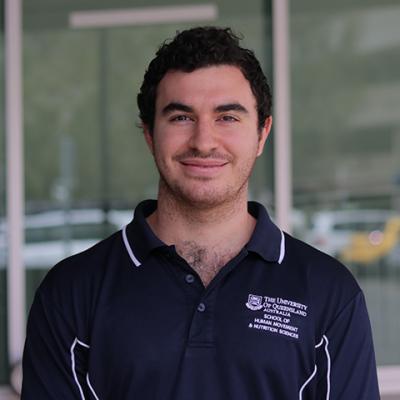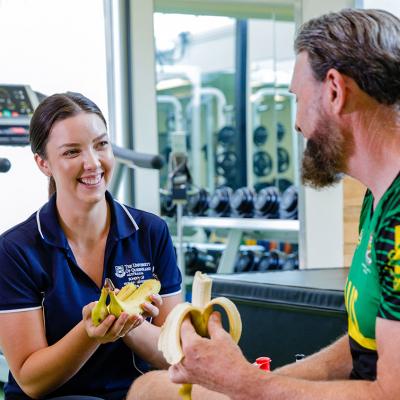Are you passionate about making a meaningful impact on people’s lives through nutrition? By becoming a dietitian, you’ll leverage your expertise to guide individuals and communities towards healthier choices, manage medical conditions, and profoundly enhance overall wellbeing.
In Australia, while all dietitians are also considered nutritionists, not all nutritionists hold the qualifications to be called dietitians. The key difference lies in the training and regulatory standards that dietitians must meet.
To help clarify the path to this rewarding career, this comprehensive guide explains how to become a dietitian in Australia and how you can prepare to make a significant impact in the field of nutrition.
1. Complete an approved university degree
To become an accredited practising dietitian (APD) in Australia, you'll need to complete a dietetics degree accredited by Dietitians Australia. Once you have successfully completed your degree, you must then join the accredited practising dietitian program, which is Australia's national credentialing program for dietitians.
UQ offers various study pathways for you to become a dietitian in Australia:
Bachelor of Nutrition Sciences / Master of Dietetics Studies
UQ’s vertical dual degree, the Bachelor of Nutrition Sciences / Master of Dietetics Studies, will enable you to earn both a bachelor’s and master’s degree in just 4 years of full-time study. You'll be fully immersed in the fields of food, nutrition and dietetics, gaining comprehensive knowledge and practical skills essential for a successful career in dietetics.
You’ll explore how nutrition influences health and plays a role in preventing and managing conditions such as diabetes, heart disease, obesity, malnutrition, gut disorders, and allergies. Throughout the program, you'll have numerous opportunities to apply your theoretical knowledge through practical learning experiences.
Prerequisites for entry
To gain entry into the Bachelor of Nutrition Sciences / Master of Dietetics Studies, you’ll need to have completed:
- the Queensland Year 12 (or equivalent)
- General English subject (Units 3 & 4, C)*
- General Mathematics, Mathematical Methods or Specialist Mathematics (Units 3 & 4, C)
- one of Biology, Chemistry or Physics (Units 3 & 4, C).
*These prerequisites are indicative. Learn more about entry requirements for this program.
Other undergraduate study pathways
Postgraduate study
UQ’s Master of Dietetics Studies is an accredited degree that will prepare you to become an accredited practising dietitian with Dietitians Australia.
You’ll gain expertise in nutrition and dietetics for managing conditions like diabetes, heart disease, obesity, malnutrition, gut disorders, and allergies, and you'll complete 850 hours of supervised practice.
This degree opens diverse career paths in clinical settings, community health, food service management, public health, sports, private practice, research, and the food industry, allowing you to make a significant impact on health and wellbeing in the field that best suits you.
Prerequisites for entry
To gain entry into UQ’s Master of Dietetics Studies, you’ll need to:
- have completed an approved degree with tertiary studies in chemistry, biology, biochemistry, physiology, food and nutrition that meet the accreditation requirements of the national standards for dietetics
- have achieved a minimum GPA of 4.0 (entry is competitive based on GPA with a limited intake capacity).
To complete this degree, you also have to meet its inherent requirements by demonstrating essential skills and attributes.
2. Gain practical experience
While studying the UQ Master of Dietetics Studies, you'll complete 850 hours of supervised practice in a variety of settings including hospitals, community health centres, aged care facilities, the food industry, and our UQ Dietetics Clinic.
These placements allow you to apply theoretical knowledge in real-life scenarios, honing your skills and gaining invaluable hands-on experience. UQ’s programs provide extensive opportunities for practical learning.
3. Apply for accreditation and membership with Dietitians Australia
To practise as a dietitian in Australia, you need to be accredited by Dietitians Australia (DA), the national credentialing body for dietitians.
This process involves applying for accredited practising dietitian (APD) status and meeting DA's professional and ethical standards. The DA website offers valuable information on student and graduate registration.
Students enrolled in accredited programs like the Master of Dietetics Studies can become student members of Dietitians Australia.
To maintain APD status, you must renew your registration annually and complete continuing professional development (CPD) activities to keep your skills and knowledge up to date. The DA website provides detailed information on registration renewal and CPD requirements.
Membership with Dietitians Australia also provides access to professional resources, networking opportunities, and additional support for your career.
How to become a sports dietitian
To become an accredited sports dietitian in Australia, you must first qualify as a dietitian and then pursue accreditation with Sports Dietitians Australia (SDA).
Start by completing a degree in nutrition and dietetics recognised by Dietitians Australia. After that, you’ll need to become an accredited practising dietitian (APD) and gain some clinical experience.
Once you’re an APD, you can apply for SDA’s Sports Nutrition Course, which includes coursework and practical assessments focused on sports nutrition.
Upon successful completion, you'll earn accreditation as a sports dietitian, enabling you to work with athletes, teams and sports organisations across Australia.
This course also offers great networking opportunities with fellow dietitians from universities nationwide who are passionate about sports dietetics.
4. Explore career opportunities
Explore the diverse career paths in dietetics to find one that aligns with your interests and goals. Whether you're passionate about clinical settings, community health, sports nutrition, food service management, or research, each path offers unique ways to make a positive impact on people’s lives.
Consider roles such as:
- clinical dietitian
- community health educator
- sports dietitian
- food service manager.
If research or academia excites you, pursuing advanced degrees can lead to influential studies or teaching positions. Private practice and corporate wellness are also attractive options for those seeking flexibility and entrepreneurial opportunities.
"Dietetics is a dynamic profession that is continually evolving. As the industry expands, it opens up new and innovative areas of practice, offering fresh and exciting opportunities."
- Professor Sarah McNaughton, Discipline Lead of Nutrition and Dietetics at UQ
Ready to begin or advance your career in nutrition and dietetics? Explore UQ's programs in this field:
- Bachelor of Nutrition Sciences / Master of Dietetics Studies (this fast-tracked dual degree is currently seeking accreditation with Dietitians Australia, which will open op doors globally)
- Bachelor of Human Movement and Nutrition Sciences (provides a pathway to postgraduate study in dietetics)
- Bachelor of Human Movement and Nutrition Sciences / Bachelor of Science (dual degree with a pathway to postgraduate study in dietetics)
- Master of Dietetics Studies (postgraduate program).







